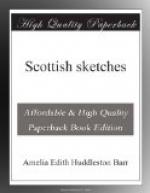“I will, Isabel. While I live I will.”
“And, O uncle, poor David! I have not been a good wife to him. Whatever happens, think of that and judge him mercifully. It is my fault, uncle, my fault, my fault! God forgive me!”
“Nae, nae, lassie; I am far from innocent mysel’;” and with these mournful accusations they parted for ever.
For Isabel’s sickness suddenly assumed an alarming character, and her dissolution was so rapid that John had scarcely got back to Glasgow ere David was sent for to see his wife die. He came back a bereaved and very wretched man; the great house was dismantled and sold, and he went home once more to Blytheswood Square.
But he could not go back to his old innocent life and self; and the change only revealed to John how terribly far astray his nephew had gone. And even Isabel’s death had no reforming influence on him; it only roused regrets and self-reproaches, which made liquor all the more necessary to him. Then the breaking up of the house entailed much bargain-making, all of which was unfortunately cemented with glasses of whiskey toddy. Still his uncle had some new element of hope on which to work. David’s home was now near enough to his place of business to afford no excuse for remaining away all night. The children were not to be hid away in some upper room; John was determined they should be at the table and on the hearthstone; and surely their father would respect their innocence and keep himself sober for their sakes.
“It is the highest earthly motive I can gie him,” argued the anxious old man, “and he has aye had grace enough to keep out o’ my sight when he wasna himsel’; he’ll ne’er let wee John and Flora and Davie see him when the whiskey is aboon the will and the wit—that’s no to be believed.”
And for a time it seemed as if John’s tactics would prevail. There were many evenings when they were very happy. The children made so gay the quiet old parlor, and David learning to know his own boys and girl, was astonished at their childish beauty and intelligence. Often John could not bear to break up the pleasant evening time, and David and he would sit softly talking in the firelight, with little John musing quietly between them, and Flora asleep on her uncle’s lap. Then Jenny would come gently in and out and say tenderly, “Hadna the bairns better come awa to their beds?” and the old man would answer, “Bide a bit, Jenny, woman,” for he thought every such hour was building up a counter influence against the snare of strong drink.
But there is no voice in human nature that can say authoritatively, “Return!” David felt all the sweet influences with which he was surrounded, but, it must be admitted, they were sometimes an irritation to him. His business troubles, and his disagreements with his partner, were increasing rapidly; for Robert—whose hopes were set on America—was urging him to close the mill before their liabilities were any larger. He refused to believe longer in the future making good what they had lost; and certainly it was uphill work for David to struggle against accumulating bills, and a partner whose heart was not with him.




